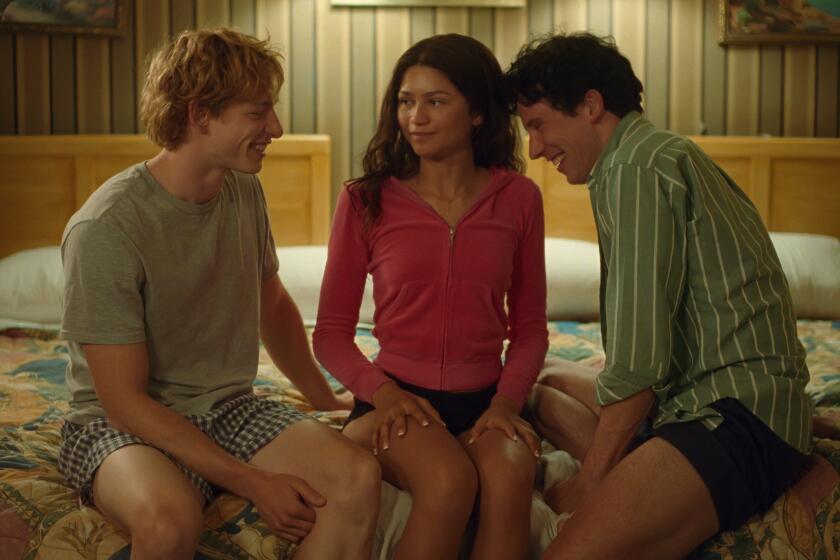The eyes of the storm
Sundance has always had a real “come-as-you-are” attitude, but its unlikely anyone has ever shown up as pregnant as Kim Roberts. “Nine months and two weeks and I still made it,” she says with pride. She took the journey from New Orleans with her doctor’s approval because “it’s an opportunity for me to get the story out. I had to make it, by any means necessary.”
Roberts, along with her husband, Scott, who also made the trip, are more than the central figures in “Trouble the Water.” The stirring documentary about Hurricane Katrina and its aftermath, directed by Tia Lessin and Carl Deal, debuted here Sunday. The harrowing home-movie footage Kim shot of the damage floodwaters did to her Lower 9th Ward home plays a prominent part in the doc and was strong enough to get filmmakers Lessin and Deal to change the film’s focus.
The experienced co-directors, longtime associates of Michael Moore, went to Louisiana to make a film on the return of that state’s National Guard from Iraq. But, Deal points out, “Michael Moore is always saying, ‘You’ve got to forget what you think you know,’ ” with Lessin adding, “What happens on the ground is what you have to key into.”
The filmmaking team weren’t even planning to go to the Red Cross shelter in Alexandria, La. “It was like, ‘Let’s leave these people alone,’ ” Deal reports. But even before they parked their vehicle, Kim and Scott had spotted them. “I seen a whole bunch of people, a cameraman, a soundman, they looked important,” Scott says. “I said to Kim, ‘If we want to get that story out, these are the people to talk to.’ ”
And talk they did. “Trouble the Water” opens with a clip of an enthusiastic, charismatic Kim (who, like her husband, is a New Orleans native) telling the crew, “Nobody’s got what I got.” Although in one sense that footage did change the film’s focus, in another, the filmmakers say, it didn’t. “Our initial mission stayed intact,” says Deal, with Lessin explaining, “The strength of the film was always going to be telling the story from the inside out.”
Being a witness for the voiceless, impoverished and dispossessed is the role that Kim felt strongly enough about to make the trip to Utah. “I watched the coverage on TV and I said, ‘They ain’t telling the real stories. What happened to the real citizens of New Orleans?’ I wanted to be a voice of the black community. We’re speaking for everyone who stayed, everyone who suffered, everyone who died.”
What’s especially remarkable about the story of community resilience and government indifference that “Trouble the Water” tells is the coincidences it took to bring it to the screen, starting with Kim’s $20 on-the-street purchase of a video camera a week before the hurricane hit. And if the Roberts’ car hadn’t been stolen three weeks before the storm, it’s likely they would have left town before it hit.
But given that they were there, Kim decided “if that destruction comes, I want to be here to tell people we had a world. Once I realized I had to stay, I thought, ‘If I die, I hope somebody finds this camera.’ And once I captured what I captured, I thought, ‘That has to be out there, that has to be on TV.’ I ain’t the only one; we’re speaking for the majority of poor black people who ain’t got no education, people who have to eat, have to buy Christmas toys to put under the tree, and that’s just the truth.”
Neither of the two shies away from the difficulties of their past, which at one point included selling drugs. “We’re hustlers; we’ve done what we have to do to survive,” Kim says. “I’m not proud of it, but I had to do what I had to do. I had mouths to feed, I had other people’s children to take care of. Family has never been about blood relatives; it’s about people who love us and we love back.”
Those harsher days, however, are in the past.
Scott has a steady job in construction and they have started a label, Born Hustler Records, to record the rap music Kim does under the name Black Kold Madina. “Katrina gave us new life, a rebirth,” Scott says. “We always had other talents, but we couldn’t find a way to break through, to show the world we had other talents.” Looking back, Kim says, “I’m glad I stayed for Katrina. It’s one of the greatest things I ever did.”
--
More to Read
The biggest entertainment stories
Get our big stories about Hollywood, film, television, music, arts, culture and more right in your inbox as soon as they publish.
You may occasionally receive promotional content from the Los Angeles Times.











